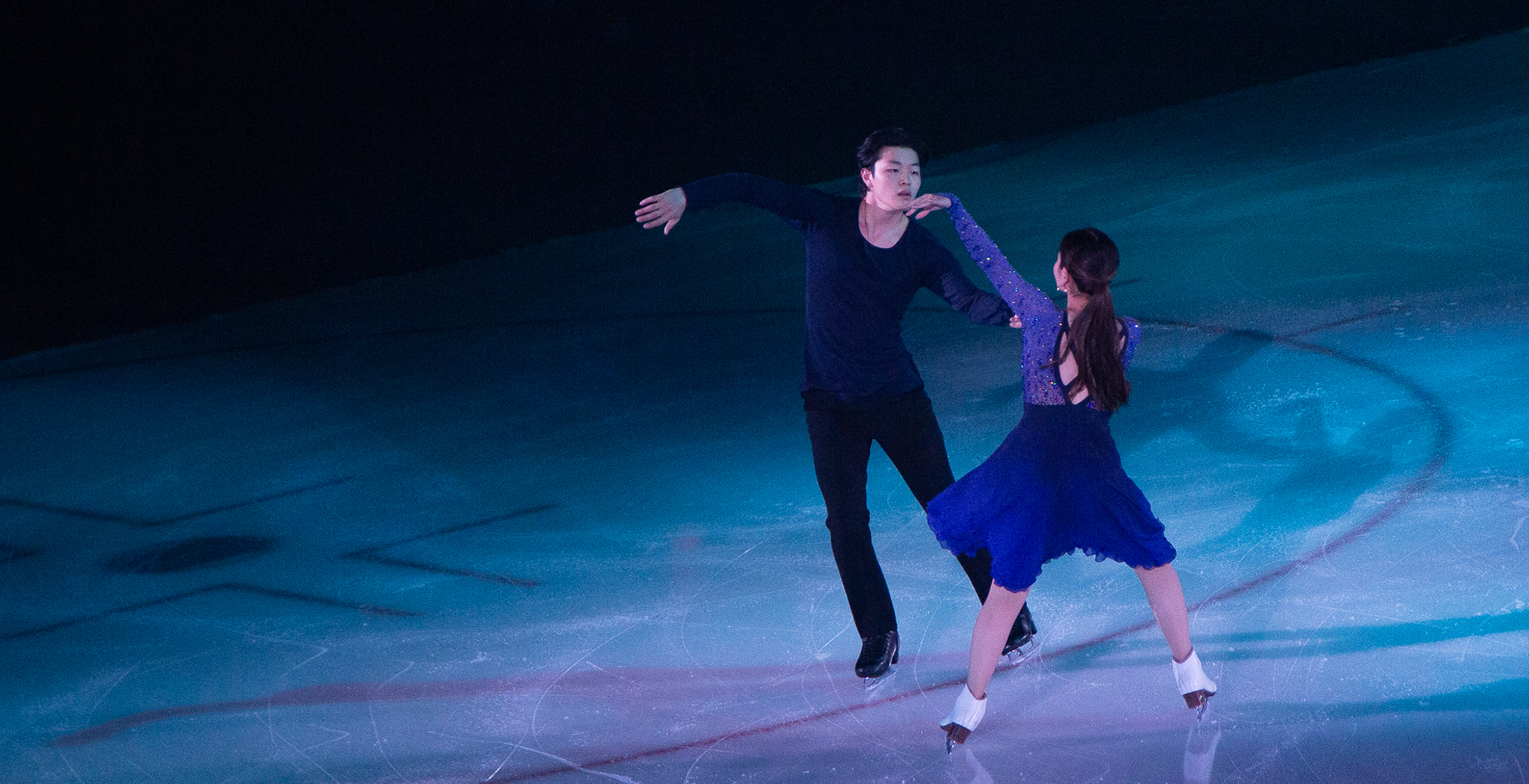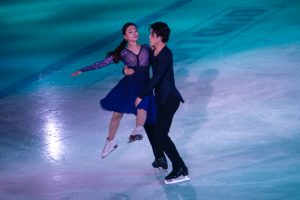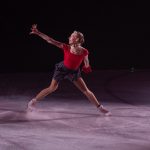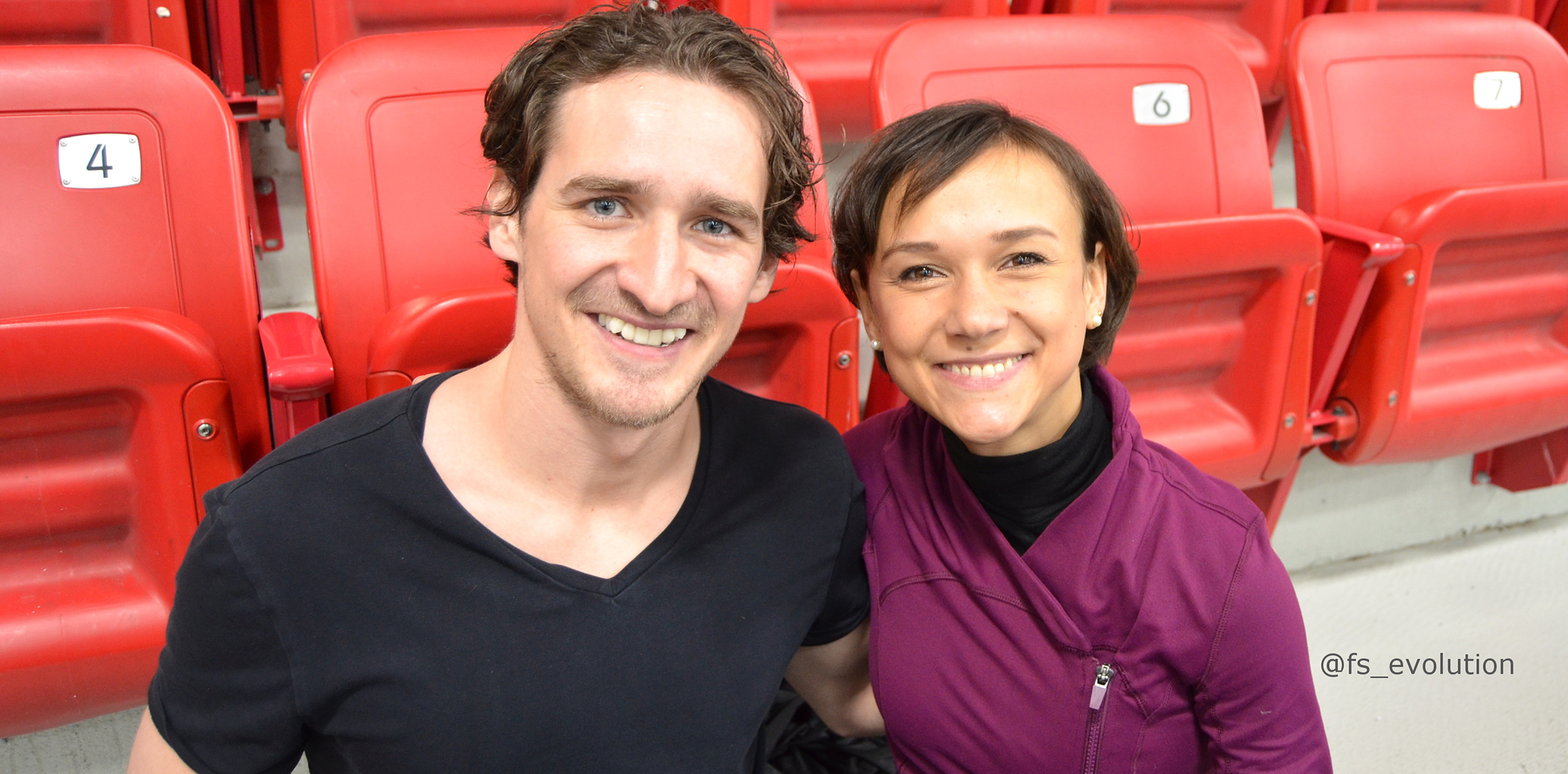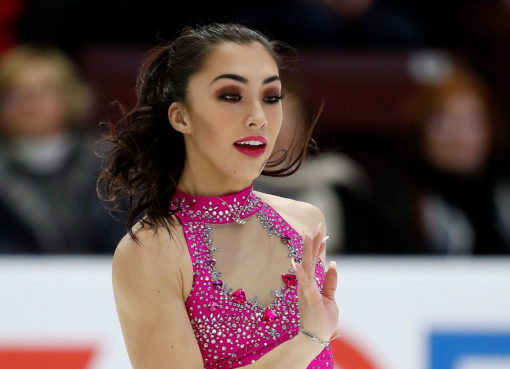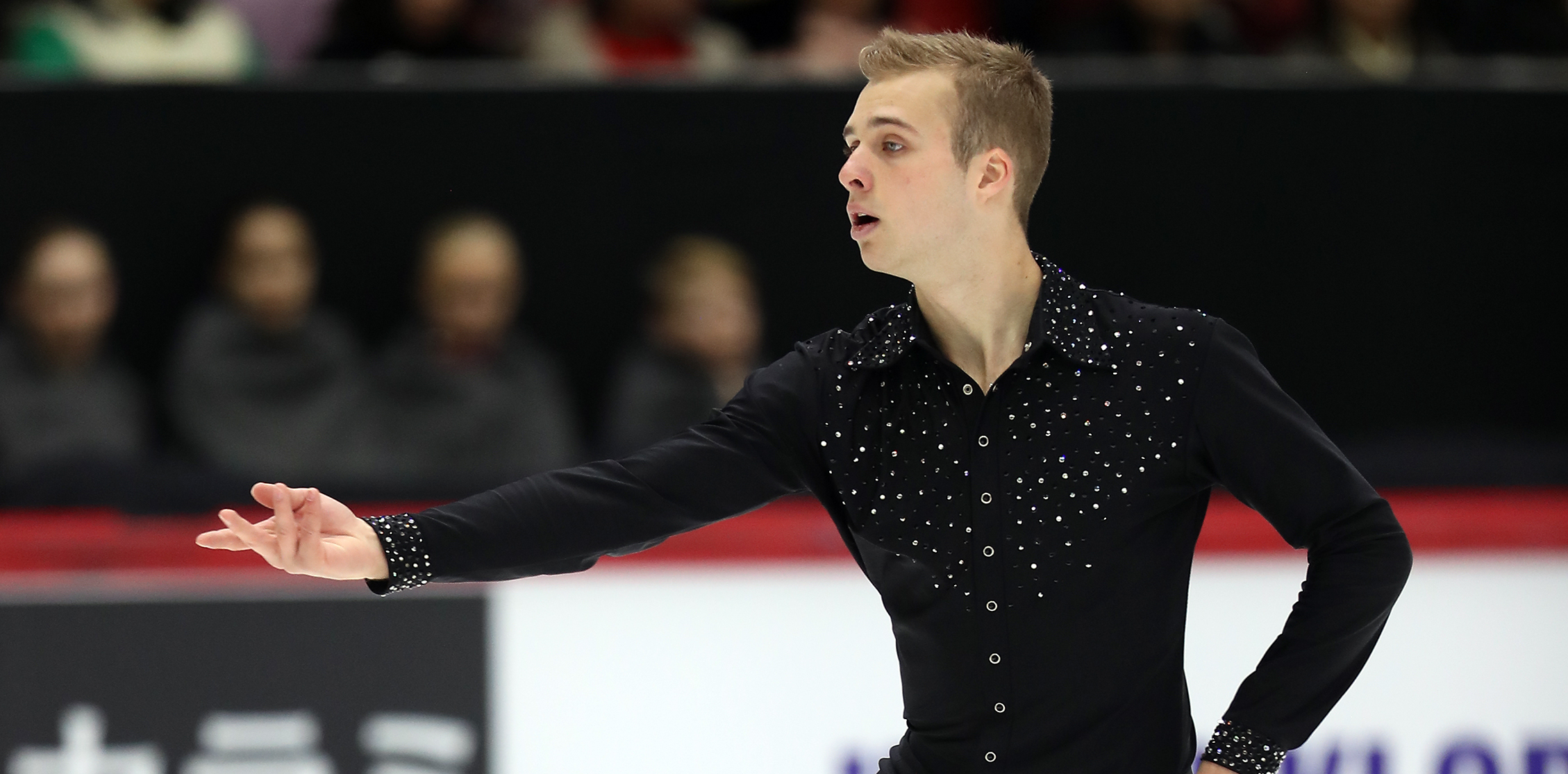By Claire Cloutier, Team FSO contributing writer
Stars on Ice photos by Deborah Owens for Stars on Ice
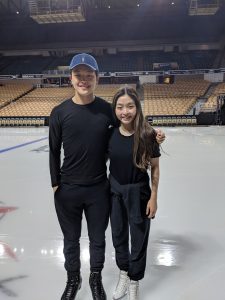
Last February, Maia Shibutani & Alex Shibutani competed in their second Olympic Games, winning two bronze medals in Pyeongchang. It was a career high point for the brother/sister duo. Since then, the Shibutanis have reaped the rewards of their success, skating in many ice shows and appearing at non-skating events as well, including the Super Bowl and the Academy Awards. It’s been a whirlwind year and several months for the ‘Shib Sibs’, who are now appearing in the U.S. Stars on Ice tour. Figure Skaters Online’s Claire Cloutier caught up with the duo at the show in Worcester, MA. They took a few minutes to chat about their experiences of the past year, including their two weeks at the Pyeongchang Olympics, programs for Stars on Ice, and more.
When Figure Skaters Online spoke with the Shibutanis, they were about to start their fourth show in as many days, after a night aboard a sleeper bus coming from the tour’s previous stop in Providence, RI. Nevertheless, they seemed calm, collected, and ready for the show.
Editor’s Note: Maia and Alex announced on May 24 (three weeks after our interview) that will extend their break from the competitive circuit and take the 2019-20 season off. Read press release here.
Figure Skaters Online (FSO): How has the Stars on Ice tour been going so far?
Maia: It’s been a fun weekend.
Alex: It’s been fun to realize I can sleep on a bus. (Laughs) The northeast shows are always great, actually. Because people drive from Massachusetts, from New Hampshire, to [see] a Rhode Island show.
Maia: There’s a lot of good skating history. A lot of young kids come to the show.
FSO: It is nice to get to talk with you in person. I have been following your career for a long time.
Alex: How long? Ahh, you didn’t think I’d quiz you. Just kidding. (Laughs)
FSO: Well, the first time I saw you live was at An Evening with Champions, the Jimmy Fund show you did at Harvard.
Alex: That must have been like juniors, or early seniors?
Maia: It was 2010. [The Shibutanis appeared in both the 2010 and 2011 Evening with Champions shows.]
Alex: Or, she saw us when we were like 9 and 6, for the first time. (Smiles)
FSO: Ha! I did not see you guys that far back. (Laughter)
So, you’ve had an amazing year and few months since the Olympics. You’ve been all over the world; you’ve been to some of the biggest events in entertainment and sports. Tell me about it. If you could pick out one thing that’s been the most exciting or meaningful, what would it be?
Alex: Where are we starting the year from?
FSO: The Olympics.
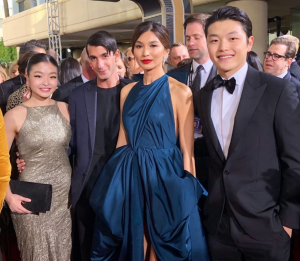
Alex: So, the Olympics was the biggest event that we went to. The most exciting, the most important. But you’re right, we’ve been traveling a lot. We got to go to the Academy Awards, and some parties for that event. And being a huge fan of movies and entertainment, and that really sort of dictating our creative approach, especially over the past few years, it’s been really cool to be there. But I don’t know. I don’t really want to pin it on any one individual event.
Maia: That’s the challenge, because we’ve had so many incredible experiences–whether it was going to the U.S. Open [tennis] for the first time, or the Super Bowl. We did shows in China, and then Japan.
Alex: When we normally wouldn’t be doing shows, at that time of year. And we went to Fashion Week in June and September and then in February. Figure skating combines all these different things that we’re passionate about, as it relates to us creating the best possible product on the ice. And getting to focus more on those individual industries, and learning how people go about being the best in those specific fields, has been really informative and exciting. We were in Japan a lot last year, for skating and non-skating-related things. And then we went to Singapore for the first time, which was really exciting. We did some sports envoy work with the U.S. State Department, and we spoke to students in Singapore.
Maia: And in Japan.
Alex: It’s been exciting to work on this 360-degree level of things that we’re passionate about, whether they relate to skating, or if they’re more about giving back–
Maia: –To the younger generation.
Alex: Using the platform that we’ve worked for.
Maia: It’s really hard for us to pick one thing, because it’s been incredibly busy. I think our approach has just been to appreciate every moment and take it all in.
Alex: It’s been a lot of growth, I think, this year. And we feel really good about how we’ve used our time.
FSO: Is it what you expected after winning an Olympic medal? Or have you been surprised by the amount of attention and access you’ve had? 
Maia: I think for us, it was our second Olympic Games, so we were really focused on bringing it in those two weeks of competition. And then, anything that happened after the fact, I think we just took it as it came.
Alex: I don’t see anything that comes after the Olympics as being part of the Olympics. The Olympics are its own thing. The reward is skating your best. If you have the good fortune of being able to perform–for us, it was two different events, the team event and the individual [event]–and feeling very satisfied about the work that we did. The Olympics are really interesting, because you’re practicing way more than [at] any other competition, you’re on-site at the venue much more than any other competition.
Maia: You can be two weeks in a row. We’d never done that before.
Alex: We just felt good about that. I wasn’t honestly thinking about anything afterward. Obviously, having watched Tanith (Belbin) and Ben (Agosto) go through their career, and Meryl (Davis) and Charlie (White), and Tessa (Virtue) and Scott (Moir), we realized that everyone watches the Olympics, around the world, and so it’s an amazing platform for the sport to be on for those two weeks. And there are certain opportunities that arise if you’re able to resonate with the viewing public. So we knew our schedule was potentially going to be busy. But, at a certain point … 2018 folds into 2019, and the Olympics were in 2018, and that’s a thing of the past. And everyone’s starting to look forward. It’s been nice to stay very busy, and have opportunities where people are still interested in hearing what we have to say, and learning about our lives.
FSO: And now you guys are here at Stars on Ice. Can you tell me about your programs and how you chose them for the tour?
Maia: We’re really excited, because we have two new programs for the tour.
Alex: I’ll preface everything by saying that we were traveling a lot, and doing a lot of work– most of it fun, fortunately. But we were also doing a lot of skating. We love to skate. And so, we worked on a program for Japan Open–Carnival on Ice–last fall. And then we sort of looked ahead to the rest of our calendar. We [did], for last year’s Stars on Ice, an amalgam combination of our Olympic free dance and “Fix You.” We thought that fans would really appreciate that. The special thing about Stars on Ice, the year of the Olympics, is that you’re drawing in an audience that maybe hasn’t seen skating [live] before. They’ve just watched it on television. So trying to give them something that they could really connect with, that they just saw on television–to give them that live experience.
Maia: Then we also did “That’s Life” last year.
Alex: Which has always been a very crowd-pleasing, fun number for us. So, we knew from our experiences last year that we wanted to keep the energy high in our performances this year for Stars on Ice. And we had a program that we were working on with Jeff Buttle, a couple of off-seasons ago …. I think it was 2017, after Helsinki Worlds. We went to work with Jeff Buttle.
Maia: In Canada.
Alex: Yes. And we brainstormed a bunch of different ideas. And I think I mentioned Daft Punk. Jeff selected some songs, and we worked on the cut together. And we never performed that program. Because during the Olympic year, the focus has to be the competitive routines and not stressing about polishing an exhibition program, unfortunate as that may seem. And we ended up working on it ourselves and kind of going back and forth a bit with Jeff, just trying to close some of the gaps and make the program as strong as we could. So we’re excited to be performing that on this tour for the first time.
And then we also, during the last months of the year, decided that we wanted to do something that could continue to keep the momentum that we personally have made, as far as the recognition and who we are and what people like to see from us, while also doing something different and evolving our skating. Last year, everyone on tour was saying, ‘Oh, we’re going to be so sad when we don’t get to see you guys skate to Coldplay.’ And we were like, ‘Well, we’ve got to do some different stuff.’ And we did at Japan Open, and we are doing some different stuff with–
Maia: With Daft Punk.
Alex: But at the same time, I think that there’s sort of a warmth that people feel in connection with us and their [the Coldplay] music library. And we also tried to come up with something that was very different from those other programs. Last year’s program was literally a combination of two competitive programs that we had done before. This is all really from scratch–with obviously, some lifts being kind of our trademark lifts.
Maia: It’s really about engaging the energy that we know resonates well with the audience, and making sure that we can continue to keep their interest, and not just only [at] the Olympics.
Alex: The song choices also play into that. We started skating to “Us Against the World,” and then “Life in Technicolor II.” I had worked on a mash-up with one of our friends, who’s been working on our music for a long time, the last several years, of “Life in Technicolor II” and “Every Teardrop Is a Waterfall.” So we’re really proud of that, I think it’s very unique. I haven’t heard those songs mashed the way we put them together. And I think it adds a lot of energy to those pieces. The audience reactions have been great so far.
FSO: Who choreographed the new Coldplay program?
Maia: We worked on it together.
Alex: Yes, we did it ourselves. We’ve always collaborated with people in the past. But at this point, we have an understanding of each other and what we want to do. And it was sort of fun to lock ourselves up in a rink and create something, without any thought to restrictions or a time crunch. You know, some competitive years, we were like, “Okay, we’ve got 45 minutes at the end of the day to try and put something together ….” So, this was really nice.
FSO: Is Coldplay part of the “Shib Sibs” brand at this point?
Alex: I would say that it has less to do with Coldplay as a band and more what their songs and music represent emotionally. Their music, a lot of it, tends to touch on tones of universally understood themes about celebrating life and love, happiness and togetherness. And in our relationship, that’s what we embody, on and off the ice. We both connect to our skating in that way. We obviously don’t do romantic-themed programs. But there’s so much more that we can show, and that only we can bring to the ice, in this particular discipline, in the field that we’re in. So we really connect to [their] music. And obviously, we have personal history, given the times that we’ve used it. They’ve definitely been a muse, or inspiration, for us. We just appreciate the messages of a lot of their songs.
FSO: You’ve dropped a few hints this year about maybe coming back to competition for Beijing 2022. Have you made any decisions about this?
Maia: You’re not the first to ask. (Laughs)
Alex: No, you’re not. I think we’ve been asked that at every Meet & Greet that we’ve done on this tour so far. And every time, we’re saying, “If we told you, we’d have to kill you. And we like you, so we don’t want to kill you.” (Laughs)
Maia: We feel like we’ve always been able to talk directly to our audience, or just share our thought process. At this moment, we’re not really talking, whether it’s at a Meet & Greet or to members of the media about it, just because it is so personal.
Alex: Yes. When we’re ready, we’ll definitely share it directly. Especially after the 2014 Games, we sort of developed this really international and very positive group of supporters–
Maia: –A community.
Alex: A community that follows us, whether we’re on the ice or off the ice doing something. They care about us, and we really appreciate that, and we’ll definitely directly reveal that to them [when ready].
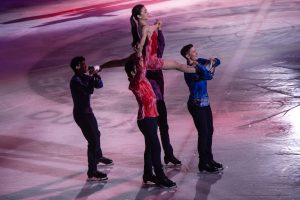 But we feel great, we feel healthy, despite our travel schedule, and being very busy. We feel good, and it’s been really nice to do the tour and get back to performing on such a regular basis. There’s nothing like tours. Competitions, you just aren’t performing in front of people as regularly. So that’s been really nice. And the tour has been great, because we got to reunite with some [skating friends]. Which is really good, to spend time with some people we haven’t seen during this past year.
But we feel great, we feel healthy, despite our travel schedule, and being very busy. We feel good, and it’s been really nice to do the tour and get back to performing on such a regular basis. There’s nothing like tours. Competitions, you just aren’t performing in front of people as regularly. So that’s been really nice. And the tour has been great, because we got to reunite with some [skating friends]. Which is really good, to spend time with some people we haven’t seen during this past year.
Maia: And just a special shout-out to Jeff Buttle. Because the show that he created for Stars on Ice–that we did in Japan and here–is really incredible. So to be able to skate with the skaters over in Japan, and then with all the skaters who are on this tour, it’s been an amazing experience.
FSO: Will you be heading back to Japan for more tours after this?
Alex: We’re not currently slated to do anything during the summer. We’ve never really done summer shows, with the exception of The Ice in Japan.
Maia: But that was a while ago.
Alex: After 2014, we chose to take the summers to [focus on] our training and create a process that was more involved. That meant spending the summer months training and not doing shows. So we’re not currently doing anything in the summer.
FSO: Based on your social media, it seems like you’ve developed an amazing circle of connections and friends–people who are doing some new things in the entertainment and media industries, like Ryan Higa, Arden Cho, “Ryanimay”, Eric Nam. What is it like to have such a circle of friends? And does their work help inspire your own?
Maia: We’ve always gravitated toward collaboration in our creative process because we have so much respect for what people can bring to the most elite level in various fields. And we’ve found that we connect really well with people from so many different backgrounds. So we’ve felt a lot of support globally, over the past year.
Alex: We vibe with people who are passionate about their work, and positive at the same time, and we see that as a very important part of our process.
Maia: It’s a big part of personal growth and learning.
Alex: If we meet someone who’s just as busy as us, we won’t see them very frequently, but we kind of cheer from afar. So whether they’re an athlete or writer or designer or director, it’s nice to have this social media where you’re connected, and you cheer each other on, and lift each other up. It’s all mutual respect. It’s a nice thing that we’ve experienced after only being in the skating community for such a long time–to sort of see the world and meet people.
FSO: You’ve been traveling so much; are you still based in Detroit? Have you been able to get back there much this year?
Maia: Yes, we were in Detroit right before we started the tour.
Alex: But we’ve been traveling quite a bit. So we haven’t really had much of a home base. We’ve been spending a lot of time in L.A., a lot of time in New York. We will be in New York for the next two weeks, when we’re not doing shows. Geographically, it’s easier for us to be there, and there’s work that we can get done there. We’ll be going back to Japan more frequently going forward. We live on a plane. And, in the case of last week, the Amtrak from Penn Station to Albany and here and back.


